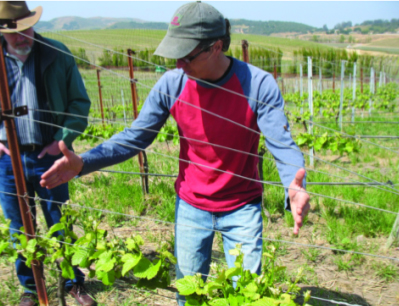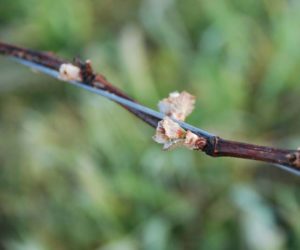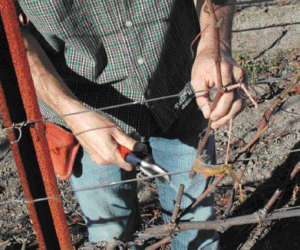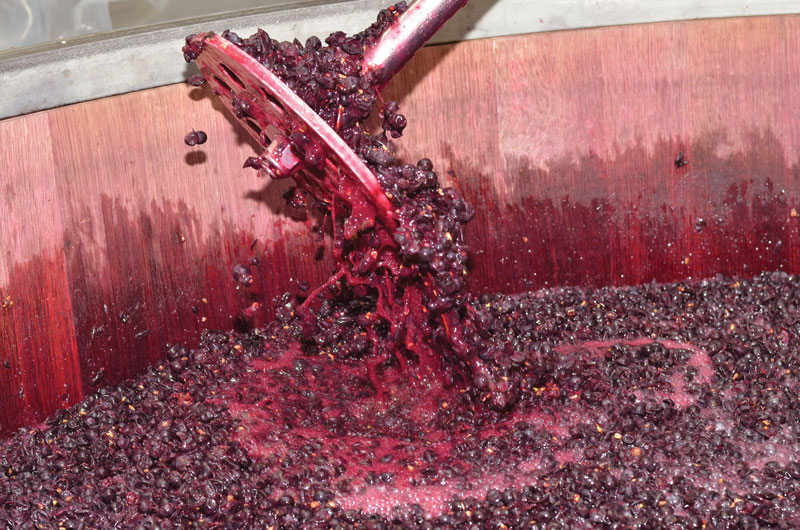
We winemakers are self-reliant. We like to be in charge of our own affairs and it can seem like a defeat to be forced to ask for help — whether it be from our spouses, our relatives or from a hired professional. There is power in self-reliance. It helps us persevere through difficulties. When we solve a problem ourselves it helps us react better in subsequent difficulties.
But what happens when we stubbornly try to plow through an issue in the vineyard where we lack expertise or the capacity to fix it? We lose an entire vintage at the worst, or have to compensate in some way that can compromise a vintage’s quality and expressiveness. The subject of this issue’s “Backyard Vines” is determining when we can solve an issue in the vineyard ourselves, and when it makes sense to call a consultant.
Part one, the greatest and worst free consultant in the world: the Internet (4-1-1)
The advent of affordable access to the World Wide Web is an information revolution that makes the invention of the printing press almost insignificant in comparison. While the relative expense of printing in the early days of the printing press insured only the most important and academically-tested tomes were reproduced, the Internet allows any yahoo to publish anything on a webpage.
My general rule of Internet research is to stick to college/university websites, and those that are published or administered by recognized experts in the field of viticulture. Reading blogs and posts by recognized industry leaders is another option, as they are generally descriptive and their narrative structure makes them easy to read and understand. But none of these articles or websites can help make great wine by themselves. Viticulture is so site specific that we need to forge the raw metal of information within the workshop of our own vineyards, and tools are worthless unless they are wielded by an informed and experienced hand.
The best use of Internet research is within the context of a hands-on approach in the vineyard. That means walking the rows every day (or at least three times a week), taking notes, reading books, participating in bulletin board conversations, reading vineyard blogs, researching integrated pest management (IPM) through the UC-Davis, Cal State Fresno, Cornell, Iowa and Minnesota State University websites, as well as traveling and visiting other local commercial and backyard vineyards and winemaking facilities.
So, are you isolated or isolating yourself? Most folks struggling in their backyard vineyards fall into one of
these categories:
1. They have isolated themselves and fail to visit local vineyards and wineries and research local production methods.
2. They are growing grapes in an area with limited resources, few vineyards and little to no schools or experts studying viticulture.
If you can relate to the problem expressed in #1 above, it’s time to get in the car and start visiting and reaching out to local schools, vineyards and wineries. If you are truly isolated from
a community of winegrowers, then you need to find a not-too-distant
community (regional) that has some similar growing conditions and some of the issues that you face in your home vineyard.
A cautionary tale from Southern California:
Almost a decade ago I visited San Diego County, California to take a look at some backyard vineyards for a client. The property was adjacent to the Temecula Valley AVA — right over a hill from a property that produced some very drinkable Cabernet Sauvignon. To be honest, I was horrified by what I saw surrounding their beautiful home between Murrieta and Temecula. There were rickety wooden stakes with wires haphazardly strung between them, and I saw what looked to be anemic and jaundiced Pinot Noir vines, which in some areas were showing the clear blotchy yellow and red foliar symptoms of the dreaded Pierce’s Disease. The irrigation lines were drooping from an improper install, and I couldn’t find much to be excited about. It was a hack job, and I was reluctant to share just how bad things were, thinking the owners may take my synopsis personally and retract their offer for dinner at George’s and a comfy bed to sleep in.
Now these were not folks that lacked common sense or caution. Their home was valued in the millions and I still clearly remember seeing pictures of the homeowner in professional portraits with the last four presidents of the United States as well as other dignitaries. To make a long story short, however, that family was taken by a fly-by-night vineyard consultation and installation company that installed a number of local small commercial and larger home vineyards in San Diego and Riverside, which then disappeared off the face of the planet. They required payment in cash or by check, had no business cards, no license, a cellphone contact number that only worked until they got paid, etc. The price seemed very good, but they had no references. They used cheap materials that made a new vineyard install look legitimate, but would start to sag and rust as early as the first year of growth. Even though they promised help in the farming, the company disappeared before the vineyard ever produced fruit.
Not only was the family out $25,000 for a 2-acre install, but the charlatans promised them a palatable Pinot Noir on soil and in a region that would not even allow Pinot Noir to grow properly to the point where it could be harvested for wine. The fruit would ripen in August and be raisined by early September. What small amount of fruit was harvested and vinified made something that would be better at stripping paint than matching a nice piece of grilled salmon. Even though the $25,000 was fairly inconsequential for the overall finances of the family, the process had sucked any love for vineyards out of them, and after I confirmed their worst fears, they paid me for my bad news and pulled the vineyard out.
Why hire a consultant? (The 9-1-1)
As always, I try to provide resources and information that will allow you to teach yourself how to grow grapes. As I stress repeatedly, there is no such thing as a perfect vineyard, only a vineyard that is slowly being perfected. Even after 18 years here at Clos Pepe, I am still learning every week how to microbalance the vines here. So to answer the question specifically, I see two specific reasons for hiring a vineyard consultant.
1. Hire a consultant at the beginning of the project to give you a proper start; eliminate mistakes made in the design, layout, preparation and planting of a new vineyard.
2. Bring in a consultant as a result of failing to find pertinent and localized information to improve or save a vintage or vineyard. In other words you have searched and searched for information that is relevant to your vineyard site, and cannot find any information from universities, websites or other resources.
What a good vineyard consultant should do:
• Return your call or email within 48 hours.
• Give a clear schedule of fees, costs, etc. Give a clear indication who pays for travel costs, incidentals, etc.
• Offers a list of at least three previous clients who you can contact for referrals.
• Admits how much (or how little) experience they have with your specific locale, your varietals, and the wine style you are trying to produce.
• Seems to be honestly interested in your process.
• Will offer a balanced view of vineyard installation and maintenance, stressing the relative difficulty in keeping up a vineyard and discouraging half-committed clients from planting a vineyard in the first place.
Pro tips for using a consultant:
• Young guns in the business are often more affordable and willing to travel. Look for young winegrowers with multi-generational winegrowing families, at least 5–10 years of experience, and those who express interest and expertise in what you are trying to accomplish.
• Taste wines from projects they have been personally involved with. Make sure they suit your taste.
• Be very clear about what you want and expect from a consultation, and let them know exactly what a successful consultation means to you and your vineyard.
• Let the consultant know (ahead of the initial consult) if you have soil and water test results available for them. It’s better to dig some test pits yourself and send your soil and water for testing so the consultant doesn’t have to complete these tests at $100/hour. If the consultant can have these tests when they arrive at your vineyard, you will save a lot of time and money on the consultation, and they will be able to instantly read your issues in context of actual scientific data.
• If you have pictures of your vineyard from each month, especially pics that show problems in certain vines, that will be helpful as well.
• Time the initial consult carefully. Having a pro arrive during dormancy or at budbreak may not be as helpful as them seeing the vineyard in late spring or early summer, which would be my best suggestion for timing for most issues, as well as suggestions concerning canopy management.
• Make sure you will get a written summary of their observations and recommendations as part of their hourly fee/consultation cost.
• Ask the consultant if you can videotape the consultation so you can watch it over and over for full value.
What is a bad consultant?
• One that tries to sell you a book instead of instigating a visit.
• One that thinks they can solve your problem without seeing the vineyard and/or soil and water test results.
• One without references or a professional resume that can be confirmed.
• One that has never had a job in the wine industry.
• A fruit tree consultant, or some other farmer/agronomist that does not specialize in grapes for varietal winegrape production.
• One who insists you scrap your whole vineyard so they can bring in their company (or one they are subsidized by) to redesign and replant your vineyard. Before taking any extreme advice of a consultant, it’s likely worth a second opinion.
• A consultant that has never worked (or studied growing/soil conditions) in your locale.
Questions to ask a prospective vineyard consultant
• What’s the best wine you’ve ever consulted on, and how did you add to the quality of that wine? (Is the wine available for me to taste?)
• How do you define vine balance?
• What is a great wine, and how does viticulture influence greatness?
• What expertise/experience do you have in my specific locale, and what major hurdles do you anticipate in the production of varietal wine here in my city and state?
• What do you think is the best wine grown commercially nearest to my home vineyard?
There may not be a right or wrong answer for these questions, but a passionate and knowledgeable consultant should not hesitate in answering these queries.
OK, OK, maybe I need a consultant. Now what?
Your ease in finding a qualified consultant will depend on how close you are to: UC-Davis, Cal State Fresno, University of Minnesota, Iowa, Cornell or any other school with a viticulture program; or a commercial winegrowing area.






